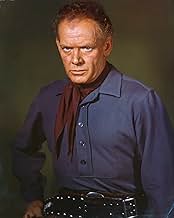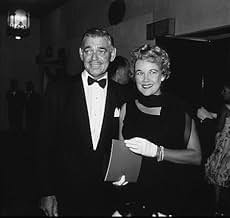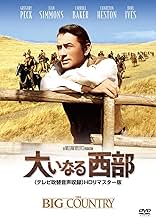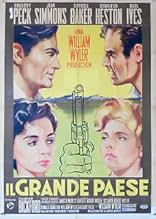NOTE IMDb
7,9/10
23 k
MA NOTE
Un homme originaire de la Nouvelle-Angleterre arrive au Far West, où il se retrouve mêlé à la querelle de deux familles qui se disputent un lopin de terre de valeur.Un homme originaire de la Nouvelle-Angleterre arrive au Far West, où il se retrouve mêlé à la querelle de deux familles qui se disputent un lopin de terre de valeur.Un homme originaire de la Nouvelle-Angleterre arrive au Far West, où il se retrouve mêlé à la querelle de deux familles qui se disputent un lopin de terre de valeur.
- Réalisation
- Scénario
- Casting principal
- Récompensé par 1 Oscar
- 3 victoires et 5 nominations au total
Slim Talbot
- Terrill Cowboy
- (as Jay Slim Talbot)
Richard Alexander
- Party Guest
- (non crédité)
Rudy Bowman
- Party Guest
- (non crédité)
Avis à la une
10alecwest
As a rule, I don't like westerns. This isn't because I'm a city slicker (though now, I do live in a city). I grew up in rural Eastern Oregon where "real" cowboys still herd their cattle through the center of town in John Day, Oregon. My stepfather owned a 10,170 acre cattle ranch. After being raised among "real" cowboys, the Hollywood versions tend to leave me flat. The Big Country was an exception.
Jim McKay (Gregory Peck) introduced us to a different kind of man, far different than most stereotypical men of the Wild West. If I were to compare McKay's character to any other film character, it would be Ghandi. He's a man who doesn't feel obliged to seek the approval of others ... a man who believes that violence doesn't need to be used to solve problems. His secret ride of Old Thunder, making Ramon (Alfonso Bedoya) swear to keep quiet regardless of the outcome, set the tone for McKay's character. His later secret fight with Steve Leech (Charleton Heston), making him swear to keep quiet regardless of the outcome, cemented that tone. This was a REAL man whose opinion of himself was not dependent upon anyone else's opinion ... in stark contrast to anyone else in the film outside of Julie Maragon (Jean Simmons). As Ramon said, "Such a man is very rare."
Outside of McKay, my #2 favorite character in the film was Rufus Hannassey (Burl Ives). I found nothing about him distasteful considering he was a character whose back was against the wall ... whose livelihood was threatened. The things he did make perfect sense in such a situation. His only flaw was his obvious poor parenthood. He really blew it with Buck (Chuck Connors) and Buck's siblings were of the same ilk.
I'm so glad that MGM/UA finally released the widescreen version in 2001. This is a film that deserves such a presence. It may not be playing in theaters anymore but seeing it in any other display size takes so much away from it. I've seen the pan/scan version before and will never go back.
One note. The full listing of writing credits for the film adaptation is lacking. "Ambush In Blanco Canyon," originally serialized in a magazine, was later novelized into "The Big Country" by Donald Hamilton ... and Hamilton also worked on the adaptation as well as Leon Uris ("Topaz," "Exodus," "Gunfight At the OK Corral," etc.).
This epic film was not lacking for anything. It had the best writers, the best actors, the best musical score, and the best scenery of any other film of its time ... western or otherwise. And the film remains one of my favorite films of all time.
Jim McKay (Gregory Peck) introduced us to a different kind of man, far different than most stereotypical men of the Wild West. If I were to compare McKay's character to any other film character, it would be Ghandi. He's a man who doesn't feel obliged to seek the approval of others ... a man who believes that violence doesn't need to be used to solve problems. His secret ride of Old Thunder, making Ramon (Alfonso Bedoya) swear to keep quiet regardless of the outcome, set the tone for McKay's character. His later secret fight with Steve Leech (Charleton Heston), making him swear to keep quiet regardless of the outcome, cemented that tone. This was a REAL man whose opinion of himself was not dependent upon anyone else's opinion ... in stark contrast to anyone else in the film outside of Julie Maragon (Jean Simmons). As Ramon said, "Such a man is very rare."
Outside of McKay, my #2 favorite character in the film was Rufus Hannassey (Burl Ives). I found nothing about him distasteful considering he was a character whose back was against the wall ... whose livelihood was threatened. The things he did make perfect sense in such a situation. His only flaw was his obvious poor parenthood. He really blew it with Buck (Chuck Connors) and Buck's siblings were of the same ilk.
I'm so glad that MGM/UA finally released the widescreen version in 2001. This is a film that deserves such a presence. It may not be playing in theaters anymore but seeing it in any other display size takes so much away from it. I've seen the pan/scan version before and will never go back.
One note. The full listing of writing credits for the film adaptation is lacking. "Ambush In Blanco Canyon," originally serialized in a magazine, was later novelized into "The Big Country" by Donald Hamilton ... and Hamilton also worked on the adaptation as well as Leon Uris ("Topaz," "Exodus," "Gunfight At the OK Corral," etc.).
This epic film was not lacking for anything. It had the best writers, the best actors, the best musical score, and the best scenery of any other film of its time ... western or otherwise. And the film remains one of my favorite films of all time.
A delightful movie with particularly strong characters that pound the silver screen (in a good way)
No one actor steals the show making for a balanced film without any downturns.
Beautifully shot and excellently paced.
Great western :)
No one actor steals the show making for a balanced film without any downturns.
Beautifully shot and excellently paced.
Great western :)
I'm always appalled at how little William Wyler I've seen. I adore The Best Years of Our Lives and Roman Holiday, but Ben-Hur is underwhelming. Now with The Big Country winning my heart, he really deserves better. I'm a sucker for a good subversive Western. The myth of the American frontier in cinema is fascinating to me and any film that develops the ideas inherently has my attention. The Big Country is credited as the first pacifist Western as Gregory Peck refuses to fight until the last moment or acknowledge the seriousness of any conflict. He's an unconventional hero. One who teeters a line of cowardice. But this just makes him all the more endearing as a three dimensional character. Granted, the film has its caricature characters on the side, but the script has such a dry wit. Burt Ives won an Oscar for his role and coming in an hour into the film, there wasn't much spotlight left to share, but he certainly has his moments. It's a grand epic in visuals and length that I easily sunk into. It's a big country alright. Also boasts one of the best scores I've ever heard. Can't believe it's not considered a greater classic.
8/10
8/10
The Big Country is one big and fun western with concurrent plot lines. The first is the struggle between two implacable enemies, Charles Bickford and Burl Ives. The second is a four sided romantic triangle involving Gregory Peck, Jean Simmons, Charlton Heston, and Carroll Baker with Chuck Connors trying to horn in.
William Wyler directed the almost three hour western with a sure hand and your interest does not wane for one minute in this film. Gregory Peck also was a co-producer on this film as well as the first billed. He had a hand in casting a lot of the film, specifically Burl Ives in his Academy Award winning performance as Rufus Hannessy.
It's the Terrills versus the Hannessys. Charles Bickford is the local Ponderosa owner Major Terrill. Presumably the title comes from the Civil War. Bickford does play Terrill with a military bearing. My guess is that he was a Yankee soldier.
The Hannessys would now be called white trash. They look like hillbilly folk who also came west for fame and fortune. They've also got a big spread in a place called Blanco Canyon. They hate the Yankee Major as much as he hates them.
Sitting between them is Jean Simmons who has inherited a modest piece of land that sits across a river that both outfits water their cattle on as per an agreement with her late grandfather. She doesn't work the land herself any more, she teaches school in town.
Simmons tries to keep above the feud. She is friends with Carroll Baker, Charles Bickford's daughter. She's been east and is bringing home a prospective bridegroom who is a former sea captain played by Gregory Peck. That doesn't sit well with Charlton Heston who is the Terrill foreman. He's got eyes on Baker himself and Chuck Connors who is Burl Ives eldest son has eyes for Simmons when he's not in the local bordello.
A lot of started and broken relationships and a few of the cast members being killed occurs in The Big Country. My favorite scene and line in the film is when Burl Ives gives some advice to Chuck Connors on how to woo and win Jean Simmons. His big advice is to show her how much you care by taking a bath occasionally.
Charlton Heston took a role that was fourth billed because he wanted the opportunity to work with William Wyler. That was one great career move because Wyler and he hit it off so well that Wyler signed him for the lead in his next film which turned out to be Ben-Hur. Heston in his memoirs, conservative as he became, says he also got along very well with Gregory Peck who he called a "thinking man's liberal."
Peck and Wyler had worked together previously on Roman Holiday and had done good work there and also hit it off. However with Peck as a co-producer as well as star they had some clashes on the set. One notable one involved Peck wanting to retake the carriage scene where the Hannessy brothers attack Peck and Baker on the way to the Bickford ranch. Peck wasn't satisfied and wanted a retake. Wyler who was legendary for doing scenes dozens of times until he got what he wanted refused. Later when shown the finished film, Wyler had edited out and around what Peck didn't like and it came out OK. They remained friends, but never worked together again.
Simmons as the independent minded school teacher and Baker as the spoiled daddy's little girl acquit themselves well in their roles. Baker is disappointed in Peck not seeing him as her ideal western man and Simmons upbraids her with the quote I put in the review title.
This is also the final film of Alfonso Bedoya who never did get a role in an American film as good as the one he had as Gold Hat in The Treasure of the Sierra Madre. Still this is a fine farewell performance to a very colorful and talented player.
When he's on the screen Burl Ives dominates and fills it and not just physically either. Rufus Hannessy may not be to the manor born, but he has his own sense of integrity and fair play. All that Burl Ives captured in Rufus and The Big Country is worth watching just for him alone.
And that Jerome Moross score; simply one of the best ever done in the history of film.
William Wyler directed the almost three hour western with a sure hand and your interest does not wane for one minute in this film. Gregory Peck also was a co-producer on this film as well as the first billed. He had a hand in casting a lot of the film, specifically Burl Ives in his Academy Award winning performance as Rufus Hannessy.
It's the Terrills versus the Hannessys. Charles Bickford is the local Ponderosa owner Major Terrill. Presumably the title comes from the Civil War. Bickford does play Terrill with a military bearing. My guess is that he was a Yankee soldier.
The Hannessys would now be called white trash. They look like hillbilly folk who also came west for fame and fortune. They've also got a big spread in a place called Blanco Canyon. They hate the Yankee Major as much as he hates them.
Sitting between them is Jean Simmons who has inherited a modest piece of land that sits across a river that both outfits water their cattle on as per an agreement with her late grandfather. She doesn't work the land herself any more, she teaches school in town.
Simmons tries to keep above the feud. She is friends with Carroll Baker, Charles Bickford's daughter. She's been east and is bringing home a prospective bridegroom who is a former sea captain played by Gregory Peck. That doesn't sit well with Charlton Heston who is the Terrill foreman. He's got eyes on Baker himself and Chuck Connors who is Burl Ives eldest son has eyes for Simmons when he's not in the local bordello.
A lot of started and broken relationships and a few of the cast members being killed occurs in The Big Country. My favorite scene and line in the film is when Burl Ives gives some advice to Chuck Connors on how to woo and win Jean Simmons. His big advice is to show her how much you care by taking a bath occasionally.
Charlton Heston took a role that was fourth billed because he wanted the opportunity to work with William Wyler. That was one great career move because Wyler and he hit it off so well that Wyler signed him for the lead in his next film which turned out to be Ben-Hur. Heston in his memoirs, conservative as he became, says he also got along very well with Gregory Peck who he called a "thinking man's liberal."
Peck and Wyler had worked together previously on Roman Holiday and had done good work there and also hit it off. However with Peck as a co-producer as well as star they had some clashes on the set. One notable one involved Peck wanting to retake the carriage scene where the Hannessy brothers attack Peck and Baker on the way to the Bickford ranch. Peck wasn't satisfied and wanted a retake. Wyler who was legendary for doing scenes dozens of times until he got what he wanted refused. Later when shown the finished film, Wyler had edited out and around what Peck didn't like and it came out OK. They remained friends, but never worked together again.
Simmons as the independent minded school teacher and Baker as the spoiled daddy's little girl acquit themselves well in their roles. Baker is disappointed in Peck not seeing him as her ideal western man and Simmons upbraids her with the quote I put in the review title.
This is also the final film of Alfonso Bedoya who never did get a role in an American film as good as the one he had as Gold Hat in The Treasure of the Sierra Madre. Still this is a fine farewell performance to a very colorful and talented player.
When he's on the screen Burl Ives dominates and fills it and not just physically either. Rufus Hannessy may not be to the manor born, but he has his own sense of integrity and fair play. All that Burl Ives captured in Rufus and The Big Country is worth watching just for him alone.
And that Jerome Moross score; simply one of the best ever done in the history of film.
Alec West said spoke well in his post about the movie. It is one of my favorite movies for similar reasons. I would only add that I have used the film to illustrate different male and female values and styles. In Jim and Leech, and Buck as well, we see quite different versions of maleness: their world-views and how they present themselves to others. The contrast between Terrill and Hannassay is another interesting study. Pat and Julie offer a couple wonderful contrasts of female ways of being in the world. As a therapist, I have seen present day versions of these characters' values and behaviors time and again. My favorite character is Jim, but the character of greatest interest to me is Steve Leech. I admire his loyalty and find his transformation through his interactions with McKay well drawn.
Le saviez-vous
- AnecdotesThen US President Dwight D. Eisenhower gave the movie four consecutive showings at the White House and called it "simply the best film ever made. My number one favorite film."
- GaffesAt the beginning of the film Peck's character James McKay is mocked for his wearing of a bowler hat, which the characters make out as something only an easterner would wear. This is in stark contrast with history where the bowler hat was one of the most popular styles in the old west, beating out the Stetson and the sombrero. It has even been referred to as "The Hat that Won the West".
- Citations
Patricia Terrill: But if he loved me, why would he let me think he was a coward?
Julie Maragon: If you love him, why would you think it? How many times does a man have to win you?
- ConnexionsEdited into Bass on Titles (1982)
Meilleurs choix
Connectez-vous pour évaluer et suivre la liste de favoris afin de recevoir des recommandations personnalisées
- How long is The Big Country?Alimenté par Alexa
Détails
- Date de sortie
- Pays d’origine
- Langues
- Aussi connu sous le nom de
- Horizontes de grandeza
- Lieux de tournage
- Sociétés de production
- Voir plus de crédits d'entreprise sur IMDbPro
- Durée
- 2h 46min(166 min)
- Couleur
Contribuer à cette page
Suggérer une modification ou ajouter du contenu manquant























